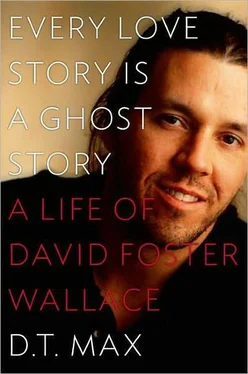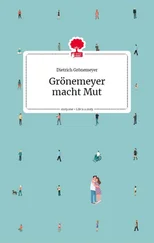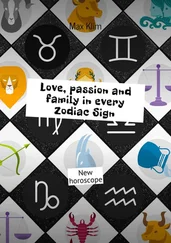The workshop with Carter was Wallace’s happiest time at Arizona. The program director was supportive in the same way Dale Peterson had been at Amherst. She herself was an entirely conventional writer and not even a very good one, but she understood that her protégé’s work was special and encouraged him to write what he wanted. “He is going to make us all very proud,” she would tell the other students. Her support for him was evident to all. At a publishing conference Carter convened, she squired Wallace around to meet important fiction agents and editors. Wallace rallied to the challenge, surprising his fellow students who thought of him as shy. They had not realized that he could play the game when he wanted to. 21
The double credit in Carter’s workshop required Wallace to supply six new stories in a semester, a rigorous pace. But he continued to write well and fast and anywhere he wanted, caught up in gusts of inspiration. One weekend that spring he disappeared. Walden grew worried, called him, went by and rang the doorbell of the casita but got no response. The next Monday at the offices of the program’s literary magazine, the Sonora Review , he presented her with the story “Little Expressionless Animals,” a tale about a young woman who is a champion Jeopardy! player. It was thirty pages long. “I wrote straight through,” he told Walden, who had been sure he had run away with another woman.
“Little Expressionless Animals” was Wallace’s first attempt to treat seriously issues that had mostly been played for laughs in Broom . Its central preoccupation is the relationship between people and the images they appropriate from media to shape and infuse their thoughts. The narrative tells the story of Julie Smith, the winner of the last seven hundred episodes of the game show. She is a smart, twentyish square peg of a young woman, a descendant of Lenore Beadsman, herself a descendant of Oedipa Maas (and of Amy Wallace). The question at hand for the show’s executives, Merv Griffin and Alex Trebek, is whether to let her continue her Jeopardy! streak. “Rules, though,” points out one of their staff. “Five slots, retire undefeated, come back for Champion’s Tourney in April…. Fairness to whole contestant pool. An ethics type of thing.” Griffin, though, prizes the ratings and the advertising income, and, more complexly, the ineluctability of a great image. He sees that Julie Smith is different. “She’s,” he says, “like some lens, a filter for that great unorganized force that some in the industry have spent their whole lives trying to locate and focus.” That filter operates only when she is on television. This girl, who is almost affectless off camera, comes alive on the set. As the narrator points out:
Something happens to Julie Smith when the red lights light. Just a something…. Every concavity…now looks to have come convex. The camera lingers on her. It seems to ogle…. Her face, on-screen, gives off an odd lambent UHF flicker; her expression, brightly serene, radiates a sort of oneness with the board’s data.
Julie, TV’s natural spawn, seems to be assuming some of its properties, to be acquiring, like Pynchon’s San Narciso, a sort of “intent to communicate.” In the end Griffin decides to have Julie play against her autistic brother—“Great P.R.,” as one staffer points out — and the story, full of mirrors and characters’ glimpsing themselves in the glass, ends appropriately with the most important mirror moment of all: “Julie and the audience look at each other.” 22
Wallace was maturing as a writer. The preoccupation with media now went deeper than just a statement of purpose. The voice of the story was diffuse, hovering, omnipresent without being omniscient. As the critic Sven Birkerts noted in a later essay in Wigwag , “Wallace does not, in fact, tell the story. Instead he inhabits for extended moments the airspace around his characters.” This charged airspace is where the artistic activity of the story resides. The story ably frustrates the MFA ukase, the order to “hook” the reader fast. What is at stake for the main character? Everything, and also nothing, the story’s tension residing, with the narrator, in the ether above her.
The story received a favorable reception in Carter’s workshop. (It would continue to be one of Wallace’s best known. He would read it publicly for years.) At one point in the story, Alex Trebek says, “My favorite word is moist ,…especially when used in combination with my second favorite word, which is loincloth .” Later when Wallace saw the young man who had supplied the phrase at the Hungarian Pastry Shop waiting in line at one of his signings, he called out, “You’re the moist loincloth guy!”
At semester’s end, Wallace decided to stay in Tucson. Walden would be there, and he could get credit for attending a teacher-training workshop at the Southern Arizona Writing Project. Wallace was used to going home in the summer and staying away turned out to be an unpleasant experience. He found the desert heat oppressive and the relationship with Walden developed problems: they had begun talking about the future, marriage and children; Wallace was not ready. They went to Nogales, just over the Mexican border—“kind of a depressing place,” as Walden remembers — and stayed for a few days, listening to the mariachis play all night long. They broke up, if temporarily. “It’s hot, here. Over 100° and climbing,” Wallace wrote Washington in July. “I have no job, no girlfriend, no friends.” He was “getting high too much, and moping.”
The early part of the summer was taken up by the page proofs of Broom , which was to be published the next January, but the work felt old and stale to him. He told JT he wished he could pull a Norman Mailer and rewrite the book from scratch. He also soon entered into what would come to be a familiar struggle with copy editors. They wanted to standardize his prose, not understanding how thoroughly thought through were his departures from standard grammar. If he used a comma in an unusual place or chose to indicate direct speech with single quotes rather than the usual double ones, there was a reason. He was going, he had written Nadell in April, to have to “copy-edit the copy-editor.” The process exhausted him. When the final proofs came in July, he sent them back to Howard with a typically confused sign-off: “Hoping Very Much I’ll Never Have To Look At That Particular Confoguration Of Words Again, Yet Eager To Do So If It Will Help Viking One Little Bit.”
Meanwhile, Howard was soliciting prepublication quotes for the novel. “No autobiography, no cocaine, no rock clubs, lots of ambition and inventiveness,” he promised Don DeLillo, who passed, as did dozens of others. Most, if they even leafed through it, likely saw the book as derivative of Pynchon, or of DeLillo himself. Elman was one of the few to offer praise — sort of. At Wallace’s request, he read the manuscript and wrote to Howard, in part, “As wild elk produce many elkins, so the American heartland produces its own Menippean satirists. David Wallace’s young genius is undimmed. The magnitude of his borrowings he pays back with interest.” When he shared the quote with Wallace, Wallace asked his old teacher what he meant. “You must not confuse the modesty of hype for lack of admiration of your talent,” the teacher replied evasively. To Howard, he was less disingenuous. “I would be hard put to defend David’s writing, for all its charm, as original, in most of the standard senses of the word.” He added, half joking, “If you want to publish really good writing you should publish mine.”
Shortly after sending off the page proofs in July, Wallace drove up to see Costello, who was now a summer associate at a law firm in Denver. They planned a weekend road trip, but at the last minute Costello was called in to work. Wallace came along to get a little experience of what it was like to be in an office. They parked in the underground garage of the nearly sixty-story building and took the elevator up to Costello’s office. Wallace, wide-eyed, settled in an empty conference room. While his old roommate took a long call from another lawyer, Wallace wrote the first draft of “Luckily the Account Representative Knew CPR” in a notebook. It is the story of two executives whom chance throws together in a huge office building, the building itself “empty and bright, dispossessed, autonomous and autonomic.” The older one has a heart attack in the building’s garage and falls slowly, inexorably to the ground:
Читать дальше












